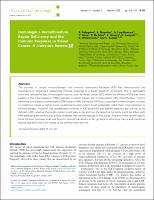| dc.contributor | Vall d'Hebron Barcelona Hospital Campus |
| dc.contributor.author | Pellegrino, B. |
| dc.contributor.author | Musolino, Antonio |
| dc.contributor.author | Llop Guevara, Alba |
| dc.contributor.author | Serra Elizalde, Violeta |
| dc.contributor.author | De Silva, P. |
| dc.contributor.author | Hlavata, Z. |
| dc.date.accessioned | 2021-10-27T12:55:34Z |
| dc.date.available | 2021-10-27T12:55:34Z |
| dc.date.copyright | 2019 |
| dc.date.issued | 2020-02-01 |
| dc.identifier.citation | Pellegrino B, Musolino A, Llop-Guevara A, Serra V, De Silva P, Hlavata Z, et al. Homologous Recombination Repair Deficiency and the Immune Response in Breast Cancer: A Literature Review. Transl Oncol. 2020 Feb 1;13(2):410–22. |
| dc.identifier.issn | 1936-5233 |
| dc.identifier.uri | https://hdl.handle.net/11351/6474 |
| dc.description | Cáncer de mama; Inmunoterapia; Daño en el ADN |
| dc.language.iso | eng |
| dc.publisher | Elsevier |
| dc.relation.ispartofseries | Translational Oncology;13(2) |
| dc.rights | Attribution-NonCommercial-NoDerivatives 4.0 International |
| dc.rights.uri | http://creativecommons.org/licenses/by-nc-nd/4.0/ |
| dc.source | Scientia |
| dc.subject | ADN - Reparació |
| dc.subject | Mama - Càncer - Immunoteràpia |
| dc.subject.mesh | Breast Neoplasms |
| dc.subject.mesh | /therapy |
| dc.subject.mesh | Recombinational DNA Repair |
| dc.title | Homologous Recombination Repair Deficiency and the Immune Response in Breast Cancer: A Literature Review |
| dc.type | info:eu-repo/semantics/article |
| dc.identifier.doi | 10.1016/j.tranon.2019.10.010 |
| dc.subject.decs | neoplasias de la mama |
| dc.subject.decs | /terapia |
| dc.subject.decs | reparación del ADN por recombinación |
| dc.relation.publishversion | https://doi.org/10.1016/j.tranon.2019.10.010 |
| dc.type.version | info:eu-repo/semantics/publishedVersion |
| dc.audience | Professionals |
| dc.contributor.organismes | Institut Català de la Salut |
| dc.contributor.authoraffiliation | [Pellegrino B, Musolino A] Medical Oncology and Breast Unit, University Hospital of Parma, Parma, Italy. [Llop-Guevara A, Serra V] Experimental Therapeutics Group, Vall d'Hebron Institute of Oncology (VHIO), Barcelona, Spain. [De Silva P] Molecular Immunology Unit, Institut Jules Bordet and Universite Libre de Bruxelles, Bruxelles, Belgium. [Hlavata Z] Medical Oncology Department, CHR Mons-Hainaut, Mons, Belgium |
| dc.identifier.pmid | 31901781 |
| dc.identifier.wos | 000513932000032 |
| dc.rights.accessrights | info:eu-repo/semantics/openAccess |

 Área privada
Área privada Contacto
Contacto







